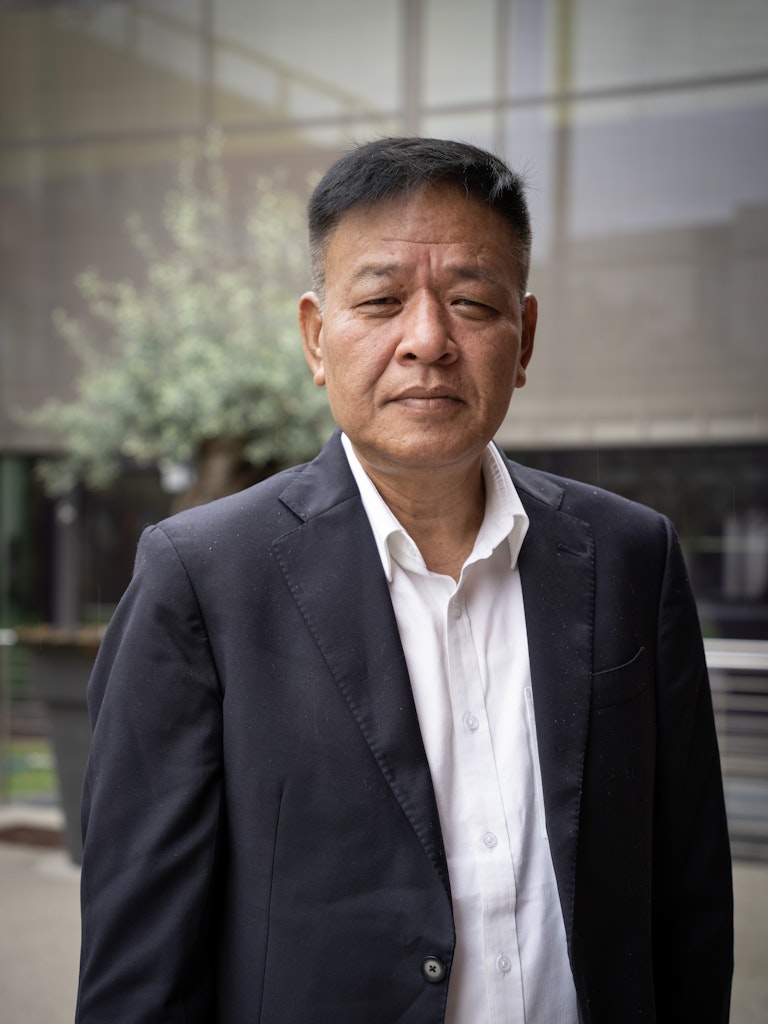Penpa Tsering has been president of the Tibetan government-in-exile in Dharamsala, India, since 2021.
© Eurac Research | Annelie Bortolotti
magazine_ Interview
“Beijing's goal is to turn young Tibetans Chinese”
An interview with the President of the Tibetan Government in Exile, Penpa Tsering.
In 1994, Eurac Research advised the Central Tibetan Administration, the Tibetan government in exile based in Dharamsala, India, on questions of autonomy for the first time. The exchange has continued ever since. Recently, the current Head of Government, Penpa Tsering, visited our research center - we interviewed him about Chinese assimilation policy, the succession of the Dalai Lama and the contradictory attitude of the West.
When people talk about human rights violations by China today, it's usually about the Uyghurs and Hong Kong - has the world forgotten about Tibet?
Penpa Tsering: No, we are beginning to see more interest again. The Uyghur concentration camps, the new security laws for Hong Kong, the UN Special Rapporteur’s criticism of the Chinese boarding schools set up in in Tibet ... China’s overall behaviour has led to everyone wanting to understand China better. In Latin America in particular, little is known about China, even though the country is an important trading partner. I have recently been to Brazil, Colombia, Mexico, and on these visits, I keep repeating: we are not just here to win support for Tibet – we are here to remind you that understanding China is good for your country, for your people. And the international community is giving us more space than before, they are willing to listen to us.
We ask the democratic countries to see us not only as victims but also as partners.
Penpa Tsering, president of the Tibetan government-in-exile
What is your message to these countries?
Penpa Tsering: It’s all the democratic countries we want to address. Firstly, we explain: if you recognize Tibet’s affiliation to the People’ s Republic of China as legitimate, you are acting against international law. What is happening in Ukraine today and what happened in Tibet seventy years ago when China occupied the country by force: it is the same law that is being broken. We are also pointing out a contradiction to Western governments who are lending legitimacy to China’s rule over Tibet, yet who claim to support negotiations on a solution between representatives of the Dalai Lama and the Chinese government. It doesn't add up. China rules Tibet with an iron fist and the entire international community parrots what the Chinese government wants it to say – so what reason should China have to talk to us? This is how the Western countries remove the ground for negotiations. We also ask all democratic countries to see us not only as victims but also as partners: to bring about positive change in China, internal and external forces must work together. Tibetans, Uyghurs, people from Hong Kong – we are the internal forces.
You mentioned the UN report on the Chinese boarding school system in Tibet, which aims to assimilate children into the dominant Han culture - to what extent does this go?
Penpa Tsering: The UN Special Rapporteur speaks of around one million young Tibetans who have been separated from their parents and forced into these boarding schools, including 150,000 children between the ages of three and six. And the system is constantly being expanded. The children are only allowed to speak Chinese. We used to be afraid of a mass Chinese immigration to Tibet, in other words a demographic attack - this is not happening to the extent we feared, perhaps also because the Chinese population is ageing and shrinking. Beijing is therefore now pursuing a new policy: to turn the young generation of Tibetans Chinese. If this continues for another decade or two, a whole generation of Tibetans will no longer know the Tibetan language, culture, religion or way of life.
This recalls the campaigns to assimilate the Uyghurs in Xinjiang ...
Penpa Tsering: That’s why I always say: while the whole world is moving towards multiculturalism, Beijing is moving in the opposite direction – at the expense of the identity of the other nationalities, the Tibetans, Mongols, Uyghurs. We sometimes bring together all these peoples who suffer from discrimination. And I keep telling our Uyghur friends: we are not competing for the world’s attention. The Uyghurs, the Hongkongers, the Tibetans: The perpetrator is always the same, so the effect on the international community is the same.
I keep telling our Uyghur friends: we are not competing for the world’s attention.
Penpa Tsering, president of the Tibetan government-in-exile
The Dalai Lama advocates a “middle way” to resolve the Tibet conflict – not a demand for independence, but one for far-reaching autonomy instead; is this also your position?
Penpa Tsering: Yes, because we believe that this is the most pragmatic position. We cannot transplant Tibet to another part of the world – we will still have to live with China as a neighbour in the future, so it is better that there is harmony between us than that we fight each other. The Dalai Lama highly values the concept of the European Union and always says that without the EU, European countries would still be fighting wars against each other. If the concept can be applied to Europe, why not to China. But to help the middle way gain more recognition, we are now pursuing a new strategy.
What does that look like?
Penpa Tsering: We are concentrating on proving Tibet’s historical status as an independent state. This will make the value of autonomy as a compromise solution clearer. And we are sending a clear message to the Chinese government that they cannot simply change history; when Beijing asked the Dalai Lama to explain that Tibet has been part of China since ancient times, his response was: I am a Buddhist monk, I cannot lie; and I am not a historian, so let’s leave history to the historians. That's why I have these two books with me: Tibet Brief 20/20 by Michael Van Walt Van Praag and Miek Boltjes - the authors have worked with hundreds of scholars and conclude that Tibet has never been considered part of China; and the book by Chinese professor Hon-Shiang Lau who has studied the historical records from the imperial era–they too always show Tibet as an independent country. But we are also sending a message to the international community: please look at Tibetan history - then you will see that you cannot say what the Chinese government wants you to say. And the third message is for the Tibetans themselves: if we don’t study our history, who else will?
If assimilation in boarding schools continues for another decade or two, a whole generation of young Tibetans will no longer know the Tibetan language, culture, religion or way of life.
Penpa Tsering, president of the Tibetan government-in-exile
Is the goal of autonomy undisputed in the exile community or are there also voices calling for independence?
Penpa Tsering: There are also those who advocate independence. But those who want independence in the future must first prove their independent status in the past. Focusing on this is also a way of giving the various elements within the Tibetan community an opportunity to work together.
Are there currently talks between the government-in-exile and Beijing?
Penpa Tsering: No. There were, to a certain extent, between 2002 and 2010 - but that was mainly because China didn’t want any criticism before the Olympics. Once the Olympics were over, the mission was accomplished: so, no more talks. At the moment we have unofficial contacts, but our expectations are not too high. However, we need to maintain communication and think long-term, beyond Xi Jingping’s reign. And as Buddhists, we believe in impermanence ... and right now there are a lot of changes.
At the moment we only have unofficial contacts with Beijing, but we don’t have too high expectations of them. However, we have to think long-term, beyond Xi Jingping’s reign.
Penpa Tsering, president of the Tibetan government-in-exile
So far, the Tibetans have followed the path of non-violence: are there voices in Tibet who no longer believe in this path in the face of oppression, who say that Tibetans must fight for their freedom?
Penpa Tsering: We don’t hear that very often. The Dalai Lama has always said: “if the Tibetans resort to violence, I am no longer responsible.” We are absolutely committed to non-violence as a means of conflict resolution. If this succeeds in Tibet, it will be an example for many violent conflicts in the world.
In view of the strict surveillance, do you manage to stay in contact and communicate with the people in Tibet?
Penpa Tsering: It is very difficult. Even the radio stations like Voice of America, Radio Free Asia, Voice of Tibet, which we broadcast from the exile community, often don’t reach the people in Tibet, there are too many jammers. India has also banned WeChat, the most popular Chinese app. But people communicate via VPN, which is one way to get information. The number of Tibetans who manage to get out of Tibet has also fallen sharply since 2008. Before 2008, between 2500 and 3000 Tibetans came to India every year - mostly children who crossed the Himalayan mountains on foot and risked their lives without knowing whether they would ever see their family again. Only five came in 2021, ten in 2022 and 47 last year. We are doing our best to get information from Tibet and also to send information. Talking on the phone is very difficult because of the wiretapping. It’s better to hide things in messages.
Do Tibetan communities in exile also feel Chinese control?
Penpa Tsering: Yes, this has greatly increased since Xi Jingping came to power. Previously, the Central United Labor Front Department, which is under the Central Committee of the Communist Party of China, focused on creating problems between nationalities within China. Now this department operates all over the world. It has many mechanisms to exert influence, for example illegal Chinese police stations in other countries, channels into political parties. This is all described very well in the book “Hidden Hand”, which explains how China is infiltrating Western democracies.
Autonomy for Tibet is the most pragmatic solution. But there are also voices in the exile community that are in favor of independence.
Penpa Tsering, president of the Tibetan government-in-exile
The Dalai Lama is 88 - the government in Beijing has already made it clear that it wants to have a say in the choice of his successor.
Penpa Tsering: In 2007, Beijing passed a law stating that the National Religious Bureau must recognize the reincarnation of the next Dalai Lama. The rulers in Beijing are waiting for the Dalai Lama to die. They are not worried about the current Dalai Lama, they are thinking about the next Dalai Lama, because they know that if they can control the Dalai Lama, they can control Tibet. But if the Chinese government chooses a Dalai Lama, there will be two Dalai Lamas - the Chinese one and the Tibetan one. And my warning to the Chinese government is: do you really want to create a problem that will still exist long after Xi Jinping is no longer with us? But the Dalai repeatedly assures us that he will live for another decade or more. He wants to say something about his successor when he is 90. So, all options are open. This makes it more complicated for the Chinese government because it cannot deal with unpredictability.
Do you think it is possible to make progress towards a solution during this Dalai Lama’s lifetime?
Penpa Tsering: That is what we all hope, because this Dalai Lama is very pragmatic. He starts from the real situation with the aim of preserving the Tibetan identity. Moreover, a solution to the conflict is not only important for Tibet, but for the whole world. Due to its geostrategic location, Tibet is central to peace and stability in the entire region and is of great importance for water and food security. Moreover, the Tibetan Buddhist culture, which is based on non-violence, peace and compassion, is of great value especially at this time when so many conflicts are ravaging the world.
Penpa Tsering
Penpa Tsering has been the “Sikyong” (president) of the Tibetan government-in-exile based in Dharamsala, India, since 2021. Since the Dalai Lama resigned from all political offices in 2011, the office has been filled by elections in Tibetan exile communities in over 30 countries. Penpa Tsering was born in exile, in a settlement of Tibetan refugees in southern India. He studied economics and was first elected to the exile parliament in 1996. From 2008, he was Speaker of the Parliament in Exile and in 2016 and 2017 he was the Dalai Lama’s North American representative in Washington.








